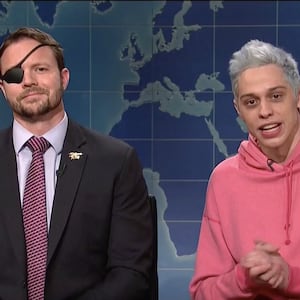Chris Evans, heretofore known as America’s Hottest Chris, is getting into politics. Or at least, that’s how the reveal of his new “secret, non-partisan civic engagement” venture has been framed.
Here is what we know about “A Starting Point,” Evans’ “secret” (?) “civic engagement” (?) project:
- It will be a website
- It will feature interviews with politicians from both parties
ADVERTISEMENT
The project became public when a video Evans sent out to Congress members got leaked (or “leaked”) to CNN. Apparently Evans was inspired to create this platform when he wanted to “get both sides of an issue in a succinct way that he can trust.”
And for some reason, instead of asking policy researchers, or academics, or librarians, or journalists, or anyone else who might actually be a “non-partisan” expert on various issues, he chose to ask: partisan politicians.
This whole thing appears to have been teased back when Rep. Dan Crenshaw (R-TX)—who infamously was an administrator on a Facebook group that circulated conspiracy theories and white nationalist memes—showed off his Captain America glass eye to Evans. Just so we’re clear on the state of our nation: an American 2-year-old with a genetic condition can’t get a wheelchair covered by his insurance company, but a congressman can have a Captain America glass eye for fun. Sure, Chris Evans, the problem with America is definitely that politicians don’t get enough of a chance to talk about whatever they want.
Here’s the thing: If you can hear the phrase “both sides” in contemporary American discourse and not immediately see red flags, you are in deep trouble, pal.
First of all, there are more than two positions on any given political issue. Democrats do not all agree, nor do Republicans. There are liberals and moderates and conservatives—a whole spectrum of ideology. And the idea that framing every issue as something in which you choose between two parties’ positions will somehow reduce partisanship seems very flawed.
Secondly, not all political issues in contemporary America have more than one “side.”
Here are some issues on which you might benefit from understanding different positions:
- Medicare for All/Universal Healthcare/Single Payer
- Open borders
- Free college
- Universal basic income
Here are some issues that do not fall under that category:
- White nationalism
- Tracking the menstrual cycles of imprisoned immigrant girls to prevent them from obtaining abortions
- Putting immigrant children in cages
- Separating immigrant children from their parents and then losing track of their origins so that they can’t be reunited
In fact, most issues would benefit more from fact-checking than from a view of “both sides.” Are claims about the costs incurred by undocumented immigrants accurate? How many children have been lost by the federal government? Would universal healthcare really be prohibitively expensive?
Evans’ video doesn’t give any indication of the “policy issues” or “common questions” to which he is going to get politicians to provide clear information. The only question we do see politicians answer is “what inspired you to get into politics in the first place,” and shockingly, no one says “my massive, ravenous ego” or “an insatiable thirst for power.” Weird.
In the video, Evans tells the politicians, “This is a chance for you to talk about issues that matter to you,” because apparently the many campaign stops, televised appearances, and Sunday morning talk shows are not enough. He tells them he’d like to keep their answers to a minute long and they all laugh about how hard that will be, though anyone who’s watched a political debate knows that politicians can very easily spend a full minute not answering a clear and direct question.
And then, while promoting his website that is supposed to be “no spin,” he tells the politicians he’s offering them “a chance not only to galvanize your base, but you might change some minds.”
How is this “no spin?”
Evans’ fundamental question—“Why isn’t there a place that I can go to hear both sides of an issue in a succinct way that I can trust?”—is truly baffling to me. Why on earth would you trust politicians more than journalists?
There’s a couple telling moments in the video. Evans says, “Right now, a lot of people don’t buy the things they read and hear,” and a politician responds, “there’s a lot of mistrust.” The clip conveniently cuts off before specifying where there’s mistrust, but anyone who has been paying attention over the last couple of years knows where that sentence was going.
“In the media.”
Journalists work very hard every day to hold politicians accountable to the people who pay their salaries. They work really hard to get politicians to answer questions—something that should be considered a politician’s responsibility, part of their job. And very few journalists have celebrity power they can use to persuade politicians to talk to them.

And now here we have Chris Evans telling politicians he’s got a bunch of questions for them, but “if you don’t like any of ‘em, we’ll skip ‘em” and “if you don’t like any of your answers, we can do ‘em over.”
This isn’t accountability. This is simply giving politicians a new platform to push their agendas. And the idea that a website like this is where you’ll get news without “spin” feeds into the misconception that has weakened journalism to a truly frightening degree.
Journalists do not “spin.” They report. Political spokespersons “spin.” Politicians “spin.” Pundits “spin.” It feels like this was something we used to understand, and I’m not sure why we don’t anymore.
When I was a news reporter, I didn’t care about changing people’s minds. Changing them from what? To what? Why? I had no stake in that. I cared about informing people, helping people feel less unsure and more savvy, shining a light on the way their government, or their city, worked. I cared about holding power to account. And politicians have power.
So do celebrities. And I’d love to see one of them use their power to do something about the national mistrust that has been sown, pitting Americans against each other. Journalists are no different than anyone else. They have bills to pay. They worry about their rights, about gas prices, about their safety. Wouldn’t dismantling this myth of the nefarious journalist, hell-bent on manipulating the people despite having nothing to gain from doing so, go a lot further in “promoting respectful discourse?”
We have a president who repeatedly calls journalists the enemy of the people. You know who benefits from mistrust in journalism? Politicians. When you doubt the accountability journalists provide, it gives powerful people cover to get away with abusing their power.






